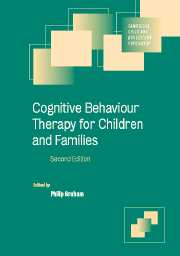Book contents
- Frontmatter
- Contents
- List of contributors
- 1 Introduction
- Part I Developmental cognitive theory and clinical practice
- Part II Engagement and assessment
- Part III Client groups
- 7 Working with parents: some ethical and practical issues
- 8 Cognitive behaviour therapy with prepubertal children
- 9 Cognitive behaviour therapy in inpatient environments
- Part IV Applications in psychosocial adversity
- Part V Applications in specific child and adolescent psychiatric disorders
- Part VI CBT applications in preventive interventions
- Index
- References
8 - Cognitive behaviour therapy with prepubertal children
Published online by Cambridge University Press: 21 August 2009
- Frontmatter
- Contents
- List of contributors
- 1 Introduction
- Part I Developmental cognitive theory and clinical practice
- Part II Engagement and assessment
- Part III Client groups
- 7 Working with parents: some ethical and practical issues
- 8 Cognitive behaviour therapy with prepubertal children
- 9 Cognitive behaviour therapy in inpatient environments
- Part IV Applications in psychosocial adversity
- Part V Applications in specific child and adolescent psychiatric disorders
- Part VI CBT applications in preventive interventions
- Index
- References
Summary
Introduction
Cognitive behaviour therapy (CBT) embraces a range of psychotherapeutic interventions that aim to ameliorate and/or reduce psychological distress and maladaptive behaviour by altering cognitive processes. CBT uses both behavioural and cognitive strategies and seeks to ‘preserve the efficacy of behavioural techniques but within a less doctrinaire context that takes account of the child's cognitive interpretations and attributions about events’ (Kendall and Hollon, 1979). Identifying, challenging and learning alternative skills to counter and replace the cognitive deficits and distortions assumed to underpin emotional and behavioural problems is the primary focus of CBT.
At what age are children able to engage in CBT?
The age at which children have sufficient cognitive development to engage in CBT has been the subject of debate. Some argue that CBT requires the ability to ‘think about thinking’ and that this meta-cognition allows children to reflect on their own behaviour and cognitive processes and to detect patterns and structures within them. This level of cognitive maturity and sophistication has led to a view that CBT is best suited for children of middle and later childhood. In a meta-review, Durlak et al. (1991) found that children aged 11–13 derived significantly more benefit from CBT than younger children. The influential sequential staged approach to cognitive development proposed by Piaget adds further support to the view that older children are better suited for CBT.
- Type
- Chapter
- Information
- Cognitive Behaviour Therapy for Children and Families , pp. 121 - 135Publisher: Cambridge University PressPrint publication year: 2004
References
- 8
- Cited by

